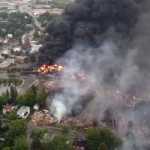Quebec Train Investigation Started
A criminal investigation was started by Canadian police on the Quebec train inferno that torched a small town close the Maine border.
The death toll in the accident went up to fifteen even as 37 residents of Lac-Megantic, Quebec remain unaccounted for and are feared to be dead. According to the coroner’s office, some of the bodies may have been vaporized during the inferno. One of the charges that investigators are considering is criminal negligence, according to Michael Forget, the Quebec Provincial Police Inspector.
The CEO and president of the railway, Edward Burkhardt, alleged that local firefighters disabled the air brakes of the train while they tried to extinguish flames inside on locomotive around one hour before the disaster. However, the fire chief denied the charge as he indicated his crew followed the policy of the railway.
Burkhardt added a number of other factors also contributed to the Quebec train inferno including the absence of an engineer at the site. A press briefing by the Transportation Safety Board of Canada confirmed the presence of an employee of the railway during the blaze. However, it remains uncertain if the braking system was checked by the employee after firefighters left the area.
Patrick Lambert, the fire chief of Nantes said the fire was put out within forty-five minutes. He added that his crew was told that the fire was out and there was no danger anymore.
A resident near the rail yard reportedly heard and saw the Quebec train roll away around five minutes after the firefighters left the area. Since the secondary line where the train was located had not warning systems, rail dispatchers were not aware that the train was rolling away.
The train rolled towards Lac-Megantic before it jumped the tracks and exploded. Around thirty buildings were destroyed by the inferno that was visible from space. It also destroyed the Musi-Café, which was filled with patrons since it was a Saturday night.
Many bodies were not recognizable as the coroner’s office in Quebec revealed that the bodies could not be identified as either female or male.
The Quebec train inferno resulted to concerns on the safety record of the Montreal, Maine & Atlantic Railway, and resulted to questions on the safety of moving oil through rail instead of a pipeline.
